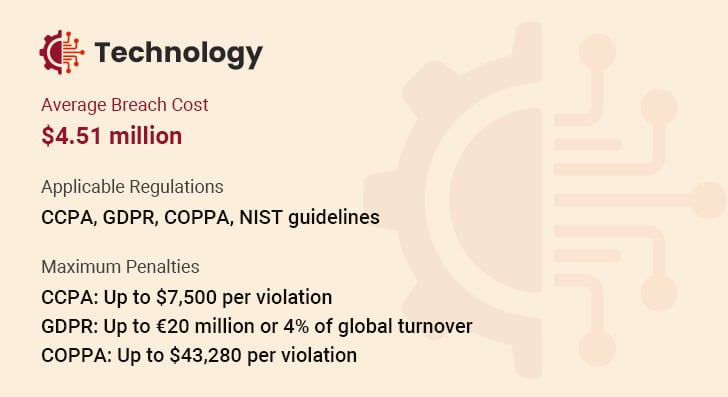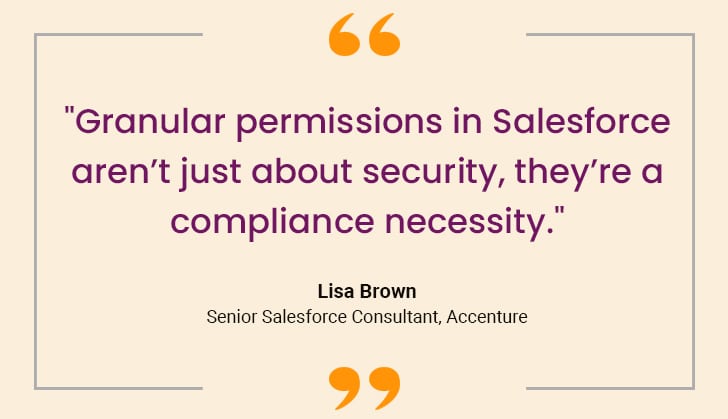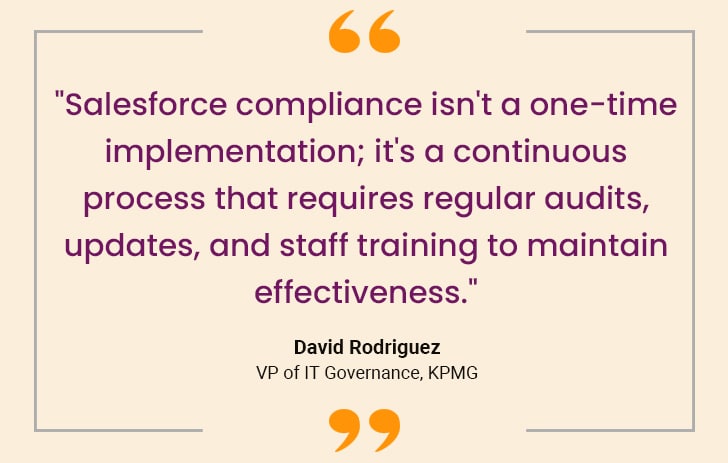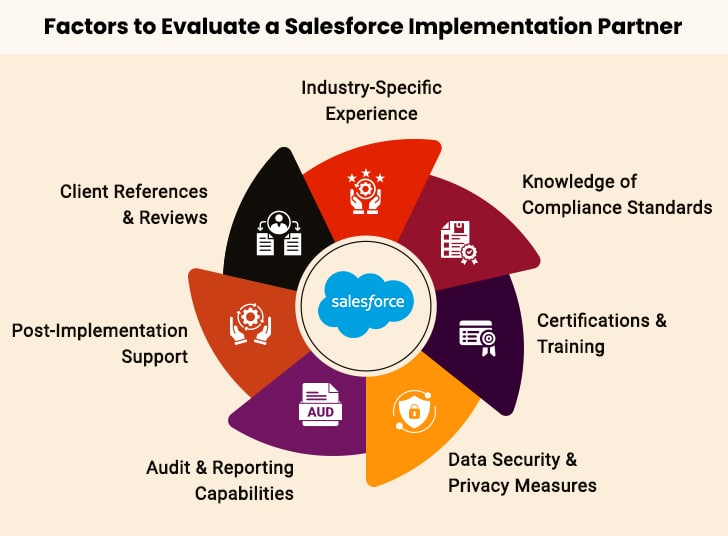Running a business in healthcare, banking, or education isn’t just about serving customers. In fact, it’s also about following strict rules. Industries like these deal with sensitive information every day, from patient records to credit card details. Governments have set up regulations like HIPAA, PCI-DSS, and FERPA to ensure the information stays safe. But as these rules evolve, companies are finding it harder to keep up.
A basic Salesforce setup won’t cut it for these industries. It might work fine for general businesses. However, when one mistake could mean legal trouble or lost customer trust, you need something stronger. That’s where compliance-first Salesforce implementation comes in. In this article, we’ll explore why regulated industries need a different approach to Salesforce implementation, one that puts compliance first without slowing down business growth.

Table of Contents
Why Compiance-First Salesforce Implementation Matters
Regulated Industry Requirements for Compliance-Driven Salesforce Implementation
Key Features for a Compliance-First Salesforce System
The Compliance-Driven Salesforce Implementation Process for Regulated Industries
Factors Affecting the Cost of Compliance-Driven Salesforce Implementation
Key Factors to Evaluate a Salesforce Implementation Partner for Industry Compliance
Why Compliance-First Salesforce Implementation Matters
Compliance-first isn’t just for banks and hospitals anymore. Any business handling sensitive data benefits from this approach. Here’s how putting rules first actually makes Salesforce work better for everyone.
I. Ensures Regulatory Adherence
Following rules from the start prevents problems later. A compliance-first approach ensures the Salesforce system meets all necessary guidelines right away. This means the business won’t have to make costly changes after implementation. The system is built to handle sensitive data properly from day one. All processes are designed to follow industry standards automatically. This saves time and effort trying to fix non-compliance issues down the road. The company can operate with confidence, knowing everything meets requirements.
II. Reduces Risk of Fines and Penalties
Breaking the rules can lead to expensive consequences. A compliance-first approach helps avoid these costs before they happen. The Salesforce system is designed to prevent actions that might violate regulations. Proper Salesforce implementation catches potential issues early when they’re easier to fix. This proactive method is cheaper than paying fines later. It also prevents the stress and disruption that comes with legal problems. Businesses also save money by getting things right the first time.

III. Ensures Audit Readiness
A compliance-first system is always prepared for inspections and reviews. All required records and logs are automatically created and stored properly. The system tracks who did what and when making it easy to show how rules are followed. Reports can also be generated when needed for official checks. Everything is organized and available in the right format. This readiness reduces stress during audits and demonstrates the business operates transparently and responsibly.
IV. Improves Data Security
Putting compliance first means building strong protection for information from the beginning. The Salesforce system is designed to keep data safe with proper controls and restrictions. Security features are also built into the system rather than added later as an afterthought. This approach creates multiple layers of protection for customer and business data. Furthermore, regular checks ensure these safeguards keep working properly over time as threats change. Good security prevents breaches that could harm people or the business.
V. Future-Proofs Your System
Building compliance into Salesforce from the start makes it ready for new rules that might come later. The system is designed to adapt when regulations change, so you won’t need big, expensive updates. It can handle stricter requirements without breaking or needing complete rework. This approach saves time and money down the road because the foundation already supports compliance needs. This helps businesses stay ahead of changes instead of rushing to catch up. Your investment lasts longer because the system grows with evolving standards.
VI. Optimizes Resource Allocation
Getting compliance right the first time means less wasted effort fixing problems later. Your team spends time moving forward instead of correcting past mistakes. Money isn’t also lost by paying fines or redoing work that didn’t meet standards. Employees can focus on their actual jobs rather than compliance emergencies. This helps businesses avoid unexpected costs from violations or system changes. Furthermore, resources go toward growth and improvement instead of damage control. Overall, planning properly from day one creates efficiency across all operations.
Top Five Salesforce Implementation Mistakes to Watch Out For
Regulated Industry Requirements for Compliance-Driven Salesforce Implementation
Not all Salesforce implementations are the same. For industries with many rules, these compliance requirements ensure the system meets legal standards while still working well for the business.
| Industry | Key Compliance Requirements | Salesforce Modules/Features | Implementation Focus Areas | Compliance Benefits |
|---|---|---|---|---|
| Healthcare | HIPAA, GDPR, Patient Data Privacy | Health Cloud, Salesforce Shield, Customer 360 | Secure patient data, EHR integration, audit logging, access control | Enhanced patient privacy, regulatory adherence, improved outcomes |
| BFSI | KYC, AML, GDPR, PCI DSS, Dodd-Frank, SOX | Financial Services Cloud, Salesforce Shield, Einstein Analytics, Customer 360, Privacy Management | Identity verification, transaction monitoring, data security, audit trails, automated reporting | Streamlined compliance, risk reduction, faster workflows, audit readiness |
| Education | FERPA, Data Privacy, Certification & Compliance Tracking | Education Cloud, Education Data Architecture (EDA), Shield | Student data security, compliance tracking, customizable workflows | Safeguarded student info, regulatory compliance, operational efficiency |
| Public Sector | FedRAMP, DoD Cloud Security, Government Data Privacy Standards | Government Cloud, Customer 360, Shield, AI & Automation | Secure citizen data, compliance certifications, automation of services | Improved citizen engagement, cost reduction, strict regulatory adherence |
| Ecommerce & Retail | PCI DSS, Data Privacy, SOX | Commerce Cloud, Salesforce Shield, Einstein Analytics | Secure payment processing, inventory management, transaction documentation | Secure transactions, accurate financial reporting |
Key Features for a Compliance-First Salesforce System
Not all Salesforce setups handle compliance the same way. These important features help create a system that keeps data safe and meets industry rules without slowing down your work.
1. Role-Based Access Controls
This feature ensures users only see what they need for their job. The Salesforce system checks each user’s role before showing information. Different access levels keep sensitive data safe from unauthorized viewing. IT staff can adjust these permissions as roles change. This control prevents accidental or intentional misuse of data. It helps follow rules about who can access what information. Proper access settings create a secure environment for all users.

2. Field-Level Security
This goes deeper than role-based controls by protecting specific data fields. Even if someone can view a record, certain fields stay hidden. Personal details like ID numbers or payment info get extra protection. The system hides these unless absolutely needed for work. This prevents unnecessary exposure of sensitive data. Field-level security works alongside role-based controls for complete protection. Together, they ensure data stays where it belongs.
3. Consent Management for GDPR/CCPA
The Salesforce system tracks who agreed to what and when. It records permissions for data collection and use. People can change their choices anytime through simple options. The system updates these preferences across all records automatically. It maintains clear records for proving compliance. This feature handles opt-ins and opt-outs properly. Proper consent tracking builds trust while following privacy laws.
4. Automated Compliance Workflows
The Salesforce system handles routine compliance tasks without manual work. It triggers required actions at the right times. Approvals, notifications, and checks happen automatically. This reduces human error in critical processes. The workflows ensure nothing gets missed or forgotten. Automation makes compliance part of daily operations. It saves time while maintaining consistent standards.
5. Audit Trails & Event Monitoring
Audit trails track who did what and when in Salesforce, creating a log of all activities. Event monitoring goes further by detecting unusual behavior in real-time. Together, they help organizations stay compliant by providing proof of actions taken. If something goes wrong, these records make it easy to investigate. They also discourage misuse since users know their actions are being watched.
The Compliance-Driven Salesforce Implementation Process for Regulated Industries
Good Salesforce implementation in regulated industries means building compliance at every step. This process shows how to set things up right while keeping all the required protections in place.
I. Conduct a Compliance Assessment
Start by examining all the rules and regulations your business must follow. Identify which ones affect how you use Salesforce in your operations. Check what data needs special protection and what processes require monitoring. Understand where your current system might not meet these requirements. This review helps spot potential problems before building anything. The assessment creates a clear picture of what needs to change to follow all necessary guidelines. Document everything carefully to guide the next steps.
II. Define Scope and Requirements
Based on the assessment, list what the Salesforce system must do to stay compliant. Decide which functions need to be added or modified. Determine what reports and records the system must produce. Set boundaries for what data can be accessed and by whom. Write down all these needs clearly so nothing gets missed. This step ensures everyone understands what the final system should achieve regarding compliance before work begins.
III. Customize and Configure Compliance-Specific Features
Adjust Salesforce settings to match your compliance needs. First, set up proper user permissions and access controls. Then, create tracking automation for core activities. Add features that help maintain required records and create alerts for potential compliance issues. Configure the system to enforce necessary rules automatically where possible. Finally, test each feature to confirm it works as intended for your regulatory environment. This step makes sure the system helps maintain compliance.
IV. Test for Compliance Validation
After setting up the system, carefully check if it meets all the required rules. Run through different scenarios to see how the system handles them. Verify that all security controls work as they should. Make sure reports contain the right information in the proper format. Test whether the system flags and prevents actions that break compliance rules. Confirm that data stays protected throughout all processes. This testing proves the system follows regulations before employees start using it daily. Fix any issues found during these checks.
V. Train Employees on Compliance Protocols
Educate staff on how to use the new system properly while following all regulations. Explain which actions are allowed and which ones to avoid. Show them how to access only the data they need for their job. Also, demonstrate how to generate required reports correctly. Make sure everyone understands why compliance matters to the business. Provide clear instructions for handling sensitive information. Good training helps prevent accidental mistakes that could cause compliance issues. Employees should know who to ask if they’re unsure about something.

VI. Perform a Compliance Audit Before Go-Live
Have experts review the entire system one final time before launch. They should check if everything meets industry standards and company policies. Verify all documentation is complete and accurate and test whether the audit trails record activities properly. Confirm that security measures protect data as intended. Also, it ensures that the system can produce all required evidence for regulators. This last review catches any remaining issues before the system goes live. Passing this audit gives confidence that the implementation truly supports compliance when real work begins.
How the Right Salesforce Partner Helps You Overcome Implementation Challenges
Factors Affecting the Cost of Compliance-Driven Salesforce Implementation
Costs for regulated Salesforce implementations depend on multiple factors. These factors show why some businesses pay more to ensure their system follows all necessary rules.
| Factor | Description | Impact on Cost |
|---|---|---|
| Business Size and Complexity | Larger organizations with complex sales processes and multiple teams/systems require more extensive implementation efforts | Higher cost due to increased scope, complexity, and longer deployment time |
| Customization and Configuration | Tailoring Salesforce with custom fields, objects, workflows, and industry-specific modules to meet unique business requirements | More customization means more development hours and specialized expertise needed. |
| User Adoption and Training | Training users and managing change to ensure effective use of Salesforce and maximize ROI | Costs increase with the need for comprehensive training programs and ongoing user support |
| Licensing and Subscription Fees | Costs vary based on Salesforce edition, number of users, and additional features or add-ons required | Larger user bases and premium editions increase recurring licensing costs |
| Compliance and Regulatory Requirements | Additional features and security measures needed for industries with strict regulations (e.g., GDPR, HIPAA, PCI DSS) | Compliance features increase cost due to specialized development and security controls |
Key Factors to Evaluate a Salesforce Implementation Partner for Industry Compliance
Salesforce implementation gets more complex in regulated industries. These evaluation points help you select a partner who can navigate compliance issues while setting up a system that works for your business.

1. Industry-Specific Experience
When choosing a Salesforce partner, it’s important they understand your specific industry. Partners who have worked with similar businesses are aware of common challenges and requirements. They can suggest solutions that actually work for your type of company rather than generic approaches. This experience helps them anticipate problems before they happen. They’ll be familiar with how data needs to flow in your industry. The right partner speaks your business language and gets what’s important to you. Their past projects show they can deliver what your company needs to succeed.
2. Knowledge of Compliance Standards
The partner must know all the rules your business has to follow. Different industries have different regulations about handling data and operations. A good partner keeps up with these changing requirements. They should explain how Salesforce will help meet these standards rather than create problems. Their team understands what reports and controls are needed to stay compliant. They build systems that automatically follow important rules where possible. This knowledge prevents costly mistakes that could happen if rules are overlooked. The right partner makes compliance part of the solution, not an afterthought.
3. Certifications & Training
Check that the partner’s team has proper Salesforce qualifications. Certified professionals have proven they know the platform well. Look for certifications that match your industry needs. The partner should also invest in keeping their team’s skills up-to-date. Ask how often their staff receive training on new features. A good partner will have processes to share knowledge across their team. Their certifications show they meet Salesforce’s own standards for quality work. This gives confidence that they can properly implement what your business requires. Regular training means they’ll use the latest best practices.
4. Data Security & Privacy Measures
The partner must show how they’ll protect your company’s information. Ask about their approach to securing sensitive data in Salesforce. They should explain the controls they’ll put in place for different user types. Good partners follow strict processes for handling customer information. They build systems that only show people what they need to see. The partner should understand how privacy laws affect your business. Their security measures should meet or exceed what your industry requires. Proper data protection prevents breaches that could damage your company. The right partner makes security a priority throughout the project.
5. Audit & Reporting Capabilities
A good Salesforce partner should help you track and review your system’s activity easily. They need to set up clear ways to monitor who does what in the system and when. The partner should create reports that show you’re following industry rules properly. These reports should be simple to understand and available when you need them. The system should keep records of all important actions automatically. This helps during official checks or internal reviews. The partner must know what information needs tracking for your specific industry. They should build tools that make audits less stressful and time-consuming. Proper tracking prevents problems before they become serious issues.
6. Post-Implementation Support
After setting up Salesforce, you’ll need ongoing help to keep it working well. The right partner offers support to fix issues quickly when they come up. They should provide training so your team can use new features as they’re added. Good partners check in regularly to see if everything meets your needs. They help adjust the system as your business or rules change over time. This support prevents small problems from becoming big headaches. The partner should explain how they handle emergencies or urgent requests. Continuous help ensures your investment keeps delivering value long after the initial setup is completed.
7. Client References & Reviews
Looking at what others say about the partner gives you real insights. Ask for contacts of clients like yours who have worked with them before. Talk to these references about how the partner handled compliance needs. Read reviews to see if they deliver what they promise. Pay attention to comments about how they solve problems and communicate. Good partners will have happy clients willing to share their experiences. This research helps you avoid partners who might not understand your requirements. Past performance is often the best indicator of future results. Taking time to check references can prevent costly mistakes in your choice.
Summing Up
Compliance-driven Salesforce implementation helps businesses in regulated industries follow the rules while using the platform effectively. By focusing on security, data handling, and audit trails, companies can avoid legal issues and build trust with customers. The right setup ensures sensitive information stays protected and meets industry standards without slowing down work. If you also want to stay compliant while getting the most out of the Salesforce system, you may consult a certified Salesforce partner with a track record in regulated industries.





